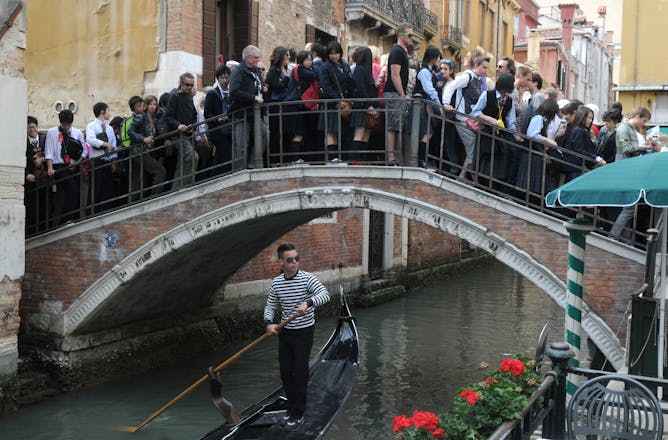|
Russia and Ukraine clashed off the battlefield this week, coming face-to-face in a courtroom instead.
Both sides traded barbs as the International Court of Justice, sometimes referred to as the World Court, finally heard statements on the legality of Russia’s invasion of Ukraine in early 2022.
Russia’s representative to the court alleged Ukraine’s leaders were linked to Nazis several dozen times. Ukraine’s representative, meanwhile, said every missile Russia fires at Ukrainian cities, “it fires in defiance of this court”.
Juliette McIntyre, an international law expert at the University of South Australia, has been following all the action (and live tweeting) throughout the hearings. In her piece for The Conversation today, she explains what the case is all about – and what could happen next.
The case was unprecedented in one respect – 32 other countries showed up to provide statements in support of Ukraine, including Australia and New Zealand. McIntyre said this had to be carefully managed: the court needed to give Russia extra time to respond to ensure the hearings were perceived as impartial.
The court will now decide whether it can hear the merits of Ukraine’s case – that Russia’s invasion violated the Genocide Convention.
Ukraine is seeking compensation in the case. Because the court lacks teeth to enforce any judgments it makes, this might be a long shot. But McIntyre says the case still has huge symbolic importance.
|

|
Justin Bergman
Senior Deputy Politics + Society Editor
|
|

Juliette McIntyre, University of South Australia
Ukraine is seeking compensation from Russia in the case, but the International Court of Justice needs to agree to hear it first.
|

Mel Marquis, Monash University; Neerav Srivastava, Monash University
The only thing Qantas seems to fear is losing landing slots. It’s time to reallocate the slots it doesn’t use.
|

Zareh Ghazarian, Monash University
The new premier has a great deal of experience in politics, but inherits the premiership with the state facing a series of major economic problems.
|

Sally Robinson, Flinders University; Karen R Fisher, UNSW Sydney
The disability royal commission has heard from thousands of people with disability and their families. But the response must involve everyone.
|

Nick Haslam, The University of Melbourne
Our health consumes a growing share of our economy and our attention, but we are not in great shape. Even as a ruinous pandemic subsides, epidemics of chronic disease, obesity, addiction and mental illness…
|

Cameron Shackell, Queensland University of Technology
AI could kill our creativity by making us think too alike. It also forces us to question what “creativity” is, and the different forms it can take.
|

Sameer Hosany, Royal Holloway University of London
The lagoon city needs to stem the flow of visitors.
|

Erin Roger, CSIRO; Cameron Slatyer, CSIRO; Dax Kellie, CSIRO
Citizen science is coming of age. The data are pouring in from observations by naturalists and birders.
|

Christina Wilkins, University of Birmingham
Within a romcom there has to be miscommunication – and lots of it.
|

Hanna Wilberg, University of Auckland
People on benefits are borrowing from the government to pay for essentials like power bills and car repairs. But repayments leave them with even less than before.
|
Politics + Society
|
-
Michelle Grattan, University of Canberra
Victorian premier Daniel Andrews' exit, the extraordinary story of Mike Pezzullo's text messages, and the Senate inquiry into QANTAS and the Qatar Airways saga. Catch up this week's politics.
-
Marina Yue Zhang, University of Technology Sydney
The revised law is targeting not only Westerners working in China, but also Chinese nationals who work for foreign companies or organisations or interact with foreigners in any way.
-
Holly Thorpe, University of Waikato
This winter’s bumper snowfall notwithstanding, the future of Ruapehu’s famous ski fields is highly uncertain. But the mountain itself will remain important in other ways.
|
|
Health + Medicine
|
-
Lauren Ball, The University of Queensland; Emily Burch, Southern Cross University
Can this really give you a natural glow? And is it healthy?
|
|
Science + Technology
|
-
Tim Bayne, Monash University
Big names in consciousness research have signed an open letter attacking ‘integrated information theory’ as pseudoscience, sparking uproar.
|
|
| |
|
|
|
NIDA
Kensington NSW, Australia
•
Full Time
|

|
|
|
|
| |
| |

|
| |
| |
| |
Featured Events, Courses & Podcasts
|
View all
|
|
1 January 2023 - 7 October 2026
•
|

|
6 July - 6 October 2023
•
|

|
11 October 2023
•
Carlton
|

|
20 - 21 October 2023
•
Australia-wide
|

|
|
|
|
| |
| |
| |
| |
| |
|
|